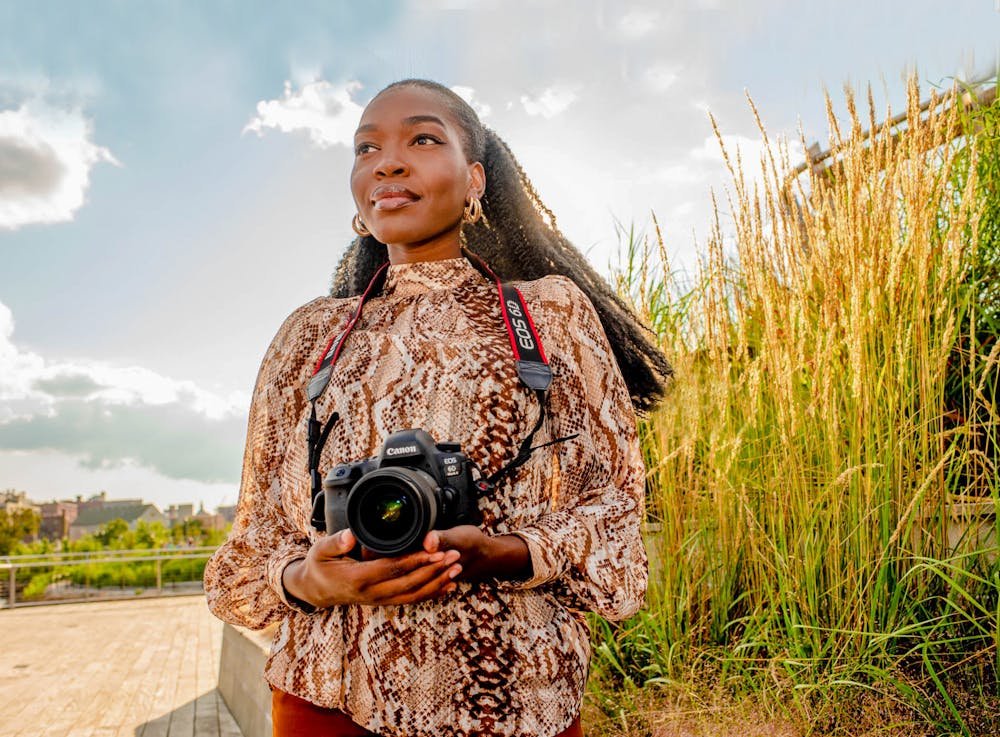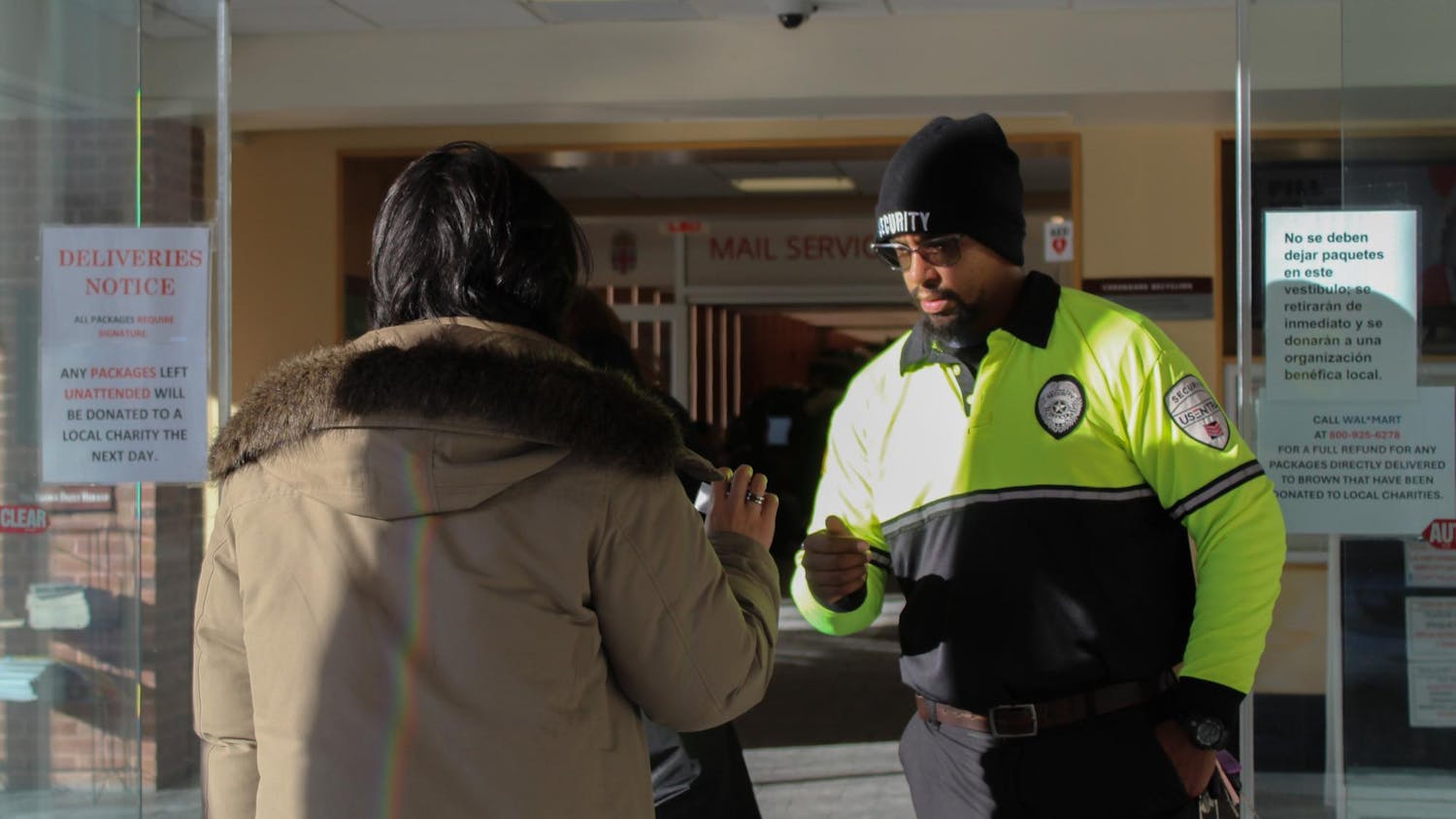In the documentary “Black Motherhood Through the Lens,” Adeiyewunmi Osinubi ’18 MD’22 follows four Black women as they navigate the maternal health care system while dealing with issues of maternal mortality, infertility and postpartum mood disorders.
Over the course of three years, Osinubi wrote, directed and produced the film while being a full-time medical student. “Black Motherhood Through the Lens” has already been accepted at seven film festivals and received recognition in Forbes magazine. Although it is not yet available for public viewing, the trailer is on the documentary’s website.
Osinubi drew inspiration from her longstanding interest in women’s health and her personal experience as a Black woman. She is part of Warren Alpert’s Physician as Communicator Scholarly Concentration Program, which emphasizes the importance of effective communication, both among health care professionals and between members of the medical field and the general public. Already an accomplished photographer, Osinubi decided to turn her camera to Black mothers to elevate their voices and draw attention to the maternal health issues they face.
“It's such an important mission, exposing the horrific rates of maternal mortality and morbidity (in Black women),” said Clinical Associate Professor of Family Medicine Teresa Schraeder, who, as the director of the Physician as Communicator scholarly concentration program, acted as a mentor to Osinubi through the filmmaking process. “The rates of maternal mortality in the Black community are three times what they are in the white community, and they actually increased during COVID,” Schraeder added.
“(Previous documentaries) about infertility really focused on white women's experiences — which (are) important, of course — but the narratives of Black women or other women of color were left out, especially those from lower socioeconomic backgrounds,” Osinubi added.
“I thought that the film would be a great medium to raise awareness about the issue of maternal mortality (and) also to talk about other disparities that affect Black women when it comes to reproductive health” that were garnering less media attention, Osinubi said, naming “infertility, as well as postpartum mood and anxiety disorders” as examples.
Osinubi followed her first source, Shannon Benjamin, from her second trimester of pregnancy to a few weeks after she gave birth.
“Her focus with me was largely on my experience as a Black woman navigating the health system as it related to my maternal health,” Benjamin said. “I had a lot of anxiety as it related to my concerns being addressed and my voice being heard” after hearing “horror stories” about how other Black women's concerns were not listened to during delivery.
“I was just so afraid something like that would happen to me,” Benjamin said.
The film also seeks to de-stigmatize topics Osinubi feels are “taboo” in the Black community, such as infertility and mental health.
“Historically, there's this idea that Black women are hyper-fertile (and) they get very pregnant very easily. However, statistics show that Black women may be two times more likely to experience infertility, and they're less likely to access fertility care such as IVF,” Osinubi said. “Dispelling that myth can really help people who are going through infertility and are like, ‘Oh, what's wrong with me? I'm supposed to be able to get pregnant because I'm Black.’ And that’s not true.”
Shaylene Costa, another documentary source, spoke about her difficulties receiving care as a “Black infertility mom” in the documentary. “It took me about eight years to find a provider that would help me become pregnant as a young, uninsured Black couple,” she said. The couple’s difficulty was exacerbated by the cost of uninsured doctor’s visits, as well as her then-fiancé’s health conditions, which put them on a deadline to conceive.
Costa’s experience with infertility, and, later, childbirth, led her to become a doula, a role through which she educates and provides medical care for pregnant women during childbirth and the postpartum period. Through this work, she helps other Black women through the childbearing process that she herself was “not prepared for.” She hopes her contribution to the documentary will also inspire future Black mothers.
“I want people to walk away from the documentary validated,” she said. “I really want it to reach the other Black women that have my same story. (So) they know that if I made it, they can make it too.”
Jai-Me Potter-Rutledge, who was also featured in the documentary, spoke about suffering from postpartum depression following the birth of her firstborn child, and about how her family’s stigma surrounding mental health made it difficult for her to garner support.
“I didn't necessarily want to talk about it with my husband or people that were close to me because I felt like there is a stigma that's associated with having a sort of mental health crisis, especially during a time that's supposed to be happy,” she said.
She kept her treatment — both her medication and therapy program — from her family. But, the help she was able to receive from the program was limited because her mental health care providers “didn’t have a lens to understand, or maybe just weren’t empathetic, to the fact that when I left (the clinic) it was a totally different level of transparency … with family members.”
“I felt like I couldn't really get the same amount of growth out of the program (as other women) because I was holding on to secrets,” she added.
Throughout the documentary, Potter-Rutledge describes other methods she used to support herself through the difficult process. And although she has since recovered from her postpartum depression, she continues to face unique challenges as a Black parent.
“Black motherhood, to me, means loving without boundaries, and preparing your children for a world that isn't necessarily ready to accept them authentically but remaining committed to preparing them anyway,” Potter-Rutledge said.
Sometimes this means having difficult conversations with her children. “Sometimes I don't have the privilege of shielding my children from the racism that they're going to face in the world, and sometimes it feels like it takes a little bit of their innocence away,” Potter-Rutledge said.
Although Potter-Rutledge was initially hesitant to share her story, she ultimately decided that “this is my calling.”
“I felt like it was part of my healing, part of my duty, to share my story, because I could potentially help someone else. And that really allowed me to be okay with knowing that this could be viewed by hundreds of thousands of people,” Potter-Rutledge said.
The film “is a testament” to the interviewees, Osinubi said, who had the “courage and bravery” to share such personal stories with the world. She said that she was as transparent as possible with her sources and included them in the editing process “because at the end of the day, ‘Black Motherhood Through the Lens’ wouldn’t exist without them.”
“(Osinubi) made me really comfortable sharing my thoughts and my feelings and my story,” Benjamin said. “I wanted to help her with her documentary. And, if possible, I wanted to help other women that may be going through or having similar feelings that I had.”
Ultimately, the film’s creator hopes that it will lead to more equitable maternal health care for Black women. To raise further awareness of Black maternal issues, Osinubi has written op-eds for Glamour and The Washington Post and has done an interview for ABC News Affiliate WCRB Boston Channel 5 "City Line" that aired March 13.
“I really hope that health care providers change their approach, because I've actually experienced … health care providers that just make assumptions about you as a patient,” Benjamin said. “There's this idea that a Black woman is just innately strong and has a higher threshold for things. And that's not true.”
In the future, Osinubi plans to continue to use film to raise awareness about issues in health care. “I really like what film can do to connect people to issues that might not necessarily affect them … I do want to continue doing this work as a physician.”
Clarification: A previous version of this article referred to Adeiyewunmi Osinubi as Ade. The article has been updated to reflect her full name.





